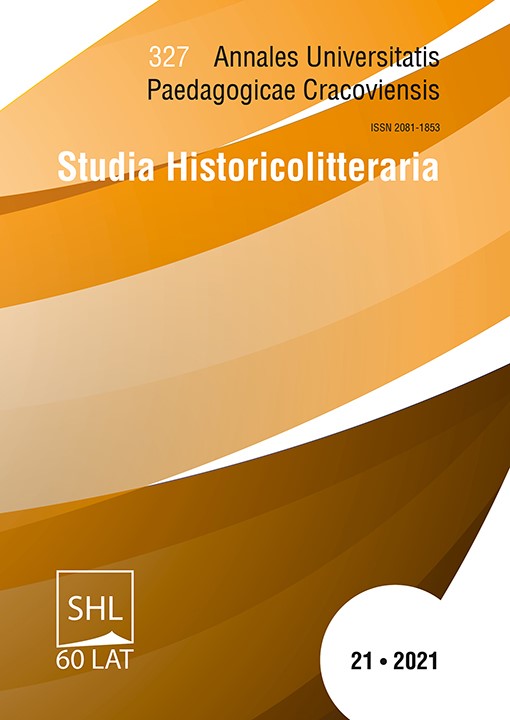The forced captivity of inhabitants of the Polish Republic by Tatars and Turks in the eye of the 17th-century memorialists
Main Article Content
Abstract
In the 17th century, both the Turks and (much more often) the Tatars invaded Poland. According to historians, the Tatars in particular treated the Polish Republic as an area of economic exploitation. Its most severe form was the forced captivity of inhabitants of the south-eastern borderlands. This was documented by diarists and memorialists of Polish seicento, including Jan Florian Drobysz Tuszyński, Mikołaj Jemiołowski, Joachim Jerlicz, Samuel Maskiewicz, Zbigniew Ossoliński, and Kazimierz Sarnecki. They drew attention to the mass character of the Tatar-Turkish thraldom: not only soldiers but also many civilians were kidnapped by the Tatars, who benefited from human trafficking and thus made them captives. The authors of the diaries documented the circumstances of the attacks, including the time and routes taken by the looters. They drew attention to the state of the captives and reconstructed the human martyrdom.
Downloads
Article Details

This work is licensed under a Creative Commons Attribution-NonCommercial-NoDerivatives 4.0 International License.
COPYRIGHT POLICY
The publisher of "Annales Universitatis Paedagogicae Cracoviensis.Studia Historicolitteraria" is authorised to use and distribute all the materials published in the journal on the basis of a non-exclusive licence agreement unlimited in time – previously concluded for an indefinite period of time each time with the author of a specific paper in the fields of exploitation specified in the agreement.
OPEN ACCESS POLICY
"Annales Universitatis Paedagogicae Cracoviensis.Studia Historicolitteraria” is an open access journal, and all its contents are available for free to users and/or their institutions on the basis of non-exclusive licenses under Creative Commons (CC BY CC-BY-4.0). Users can read, download, make copies, distribute, print, search, or to link to full text articles in this journal without the prior permission of the publisher or the author.This is consistent with the definition of open access BOAI (http://www.soros.org/openaccess).
References
Baranowski B., Znajomość Wschodu w dawnej Polsce do XVIII wieku, Łódź 1950.
Bauer M., Z dziejów batalistyki polskiej. Studia nad pamiętnikami wojennymi z XVII w., Kraków 2007.
Borek P., O polskim pamiętnikarstwie doby baroku. Rekonesans, [w:] Z dziejów staropolskiego pamiętnikarstwa. Przekroje i zbliżenia, red. P. Borek, Kraków 2012, s. 31–52.
Borek P., Uwagi o stylu staropolskich relacji pamiętnikarskich, „Annales Academiae Paedagogicae Cracoviensis. Studia Historicolitteraria II” 2002, red. H. Bursztyńska i H. Turkiewicz, s. 5–21.
Hetmani Rzeczypospolitej Obojga Narodów, red. M. Nagielski, Warszawa 1995.
Kuran M., Problematyka antyturecka i antytatarska w twórczości podkarpackich literatów staropolskich, [w:] Wirydarz staropolski i oświeceniowy, red. R. Magryś, J. Kowal i G. Trościński, Rzeszów 2020, s. 290–310.
Łątka J.S., Słownik Polaków w Imperium Osmańskim i Republice Turcji, Kraków 2005.
Pajewski J., Buńczuk i koncerz. Z dziejów wojen polsko-tureckich, Poznań 2003.
Podhorodecki L., Chanat krymski i jego stosunki z Polską w XV–XVIII w., Warszawa 1987.
Podhorodecki L., Jan III Sobieski, Warszawa 2010.
Pyłypenko W., W obliczu wroga. Polska literatura antyturecka od połowy XVI do połowy XVII wieku, przeł. P. Tafiłowski, Oświęcim 2016.
Ryba R., Literatura staropolska wobec zjawiska niewoli tatarsko-tureckiej. Studia i szkice, Katowice 2014.
Ryba R., Trzy obrazy niewoli tatarsko-tureckiej w literaturze XVII wieku, „Barok. Historia – Literatura – Sztuka” 2001, z. 1, s. 47–58.
Skorupa D., Stosunki polsko-tatarskie 1595–1623, Warszawa 2004.
Szczerbicka-Ślęk L., Duma staropolska. Z dziejów poezji melicznej, Wrocław 1964.
Ślęczka T., Hieronim Chrystian Holsten w Polsce – „potop” widziany oczyma niemieckiego najemnika, „Napis” 2006, seria XII, s. 331–345.
Tafiłowski P., „Imago Turci”. Studium z dziejów komunikacji w dawnej Polsce (1453–1572), Lublin 2013.
Weintraub W., Ekspresja a polityka w poezji Jana Kochanowskiego. Pieśń V „ksiąg wtórych”, [w:] Jan Kochanowski. Interpretacje, red. J. Błoński, Kraków 1989, s. 68–79.
Wójcik Z., Jan Kazimierz Waza, Wrocław 1997.
